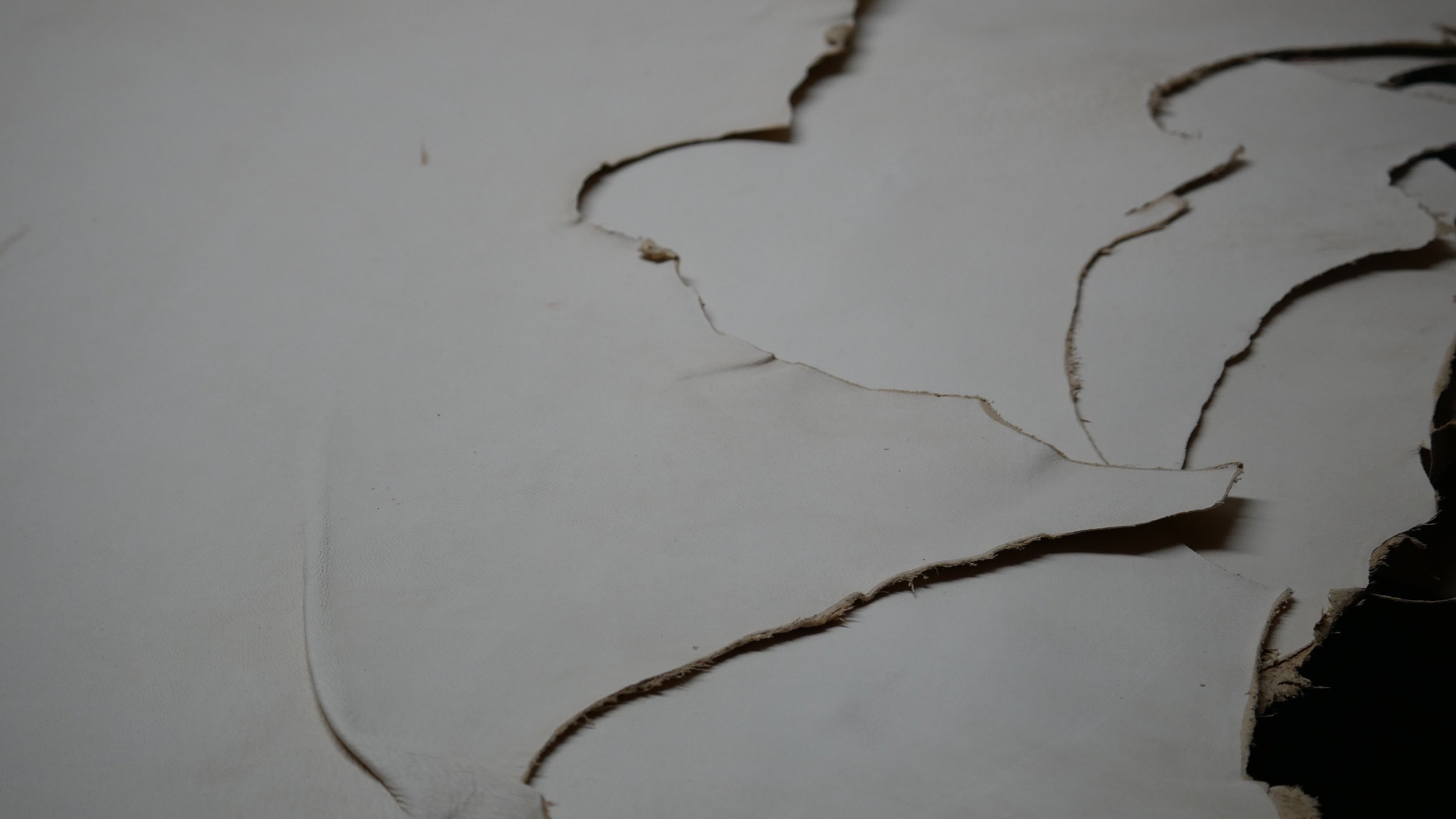By Frankie Phillips

Over recent years leather has had its fair share of bad press and considering the current manufacturing processes I can completely understand why. The focus is usually on the death of the animal used to create the garment, and I agree , this is indeed an issue. The other issues are often overlooked when it comes to normal leather production. As with polyester many chemicals are used in the production of leather, the beauty of the craftsmanship is often lost because the retail demand calls for mass produced cheaper leather, so chemicals are used to meet these demands. Do remember that normally Faux Leather, is actually plastic, and plastic kills over 100 million marine animals a year.
We are in the process of working with our suppliers and our leather manufacturer for leather alternatives, such as like our apple patches we use on our denim, This is faux leather used from compression apple juice waste. But in the meantime, our mission is to make our leather supply chain the best it can be, to benefit land and people.
Leather as a natural material is very different, with no panel of a jacket being the same. In many cases retailers require that all panels are to be of the same quality, forgetting that this is not always possible. The modern-day requirements for quality control can mean many perfect leather jackets are simply thrown away.
“The modern-day requirements for quality control can mean many perfect leather jackets are simply thrown away.”
However, It’s also understanding that leather production is a huge employer. In Tamil Nadu, in India, where we make our jackets, they employ more than 1000,000 people just in Chennai. Stopping the leather industry overnight would put over 3million people in India alone out of work which would more than likely result in this 3 million plus their families driving straight into poverty. When telling this story in the past, People have said to me that they can go find other work, but it’s not as simple as that. It’s not about cutting off a whole manufacturing process it’s about making it better.
In UK there’s a current vegan trend, brands creating vegan options and restaurants solely serving vegan food. Documentaries such as Cowspiracy and What the Health have thrown a spotlight on the intensive meat and dairy industry, exposing the impacts on animal and human health and the environment.
Instead of excessively eating more products made from industrially grown soya, maize and grains, we should think about encouraging sustainable forms of meat and dairy production based on traditional rotational systems, permanent pasture and conservation grazing.
This is a larger and must deeper conversation to be had on this subject and I am by no means an expert in this area and I’m not going to pretend to be. But I can’t help but question the ethics of driving up demand for products that require high amounts of artificial fertilisers and pesticides which in turn demolishes biodiversity and damages the soil too many points of no return. I am not encouraging mass production of meat, seeing it packed in plastic in the sale section in supermarkets makes me cry inside. There’s no question at all that we should all be eating much less meat and it’s understandable why people are so against high-carbon, polluting, unethical grain fed meat production. Instead, let’s support small independent farms to work organically and thus then in a way that’s beneficial to the environment and for the animals.
Organic farming means that the animals aren’t drugged up to high heaven with anti-worming agents and antibiotics, instead their left to roam, they are looked after and eat what they fancy, this in turn means their dung feeds earthworms, bacteria, fungi and dung beetles, which pull the manure down into the earth and acts as a natural fertiliser thus returning nutrients and structure to the soil which is vital part of ecosystem restoration. Soil loss is one of the greatest issues facing today’s world. Rise in veganism encourages more crop farming with the use of arterial fertilisers causing topsoil erosion. The truth of the matter is, the grazing livestock not only provide farmers with an income, but the animals’ dung, urine and even the way they graze, accelerates soil restoration.
“Grazing livestock not only provide farmers with an income, but the animals’ dung, urine and even the way they graze, accelerates soil restoration”
Not only does grazing aid the environment in terms of soil restoration, biodiversity and water quality, it also means healthy lives for animals and in turn health meat for us. Wholly pastures-fed meat (which is the way to go) is high in loads of goodness, especially long-chain omega-3 fatty acid DHA, with is vital for human brain development and extremely difficult for vegans to obtain.
We of course, eat far too much meat, and far too much cheap meat, it can be the reason for deforestation, ill-treatment of animals and unhealthiness for humans. And this needs to stop.
